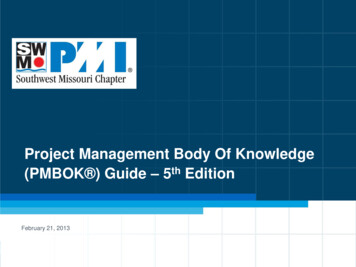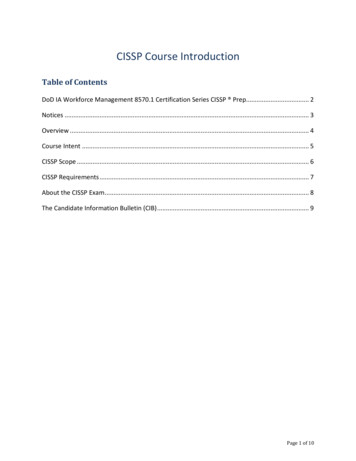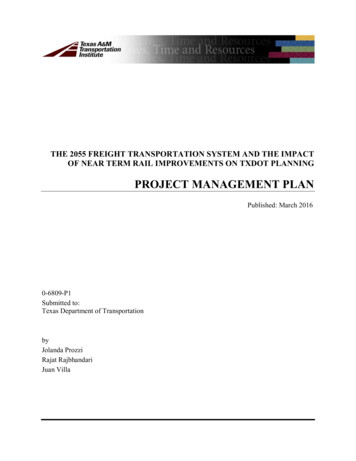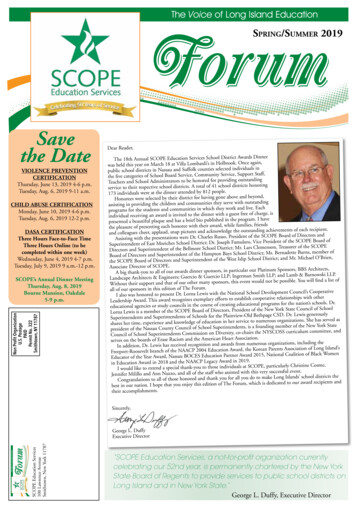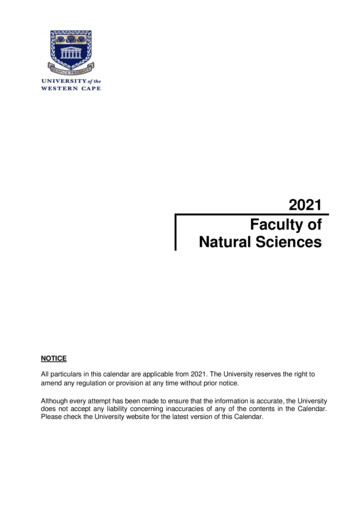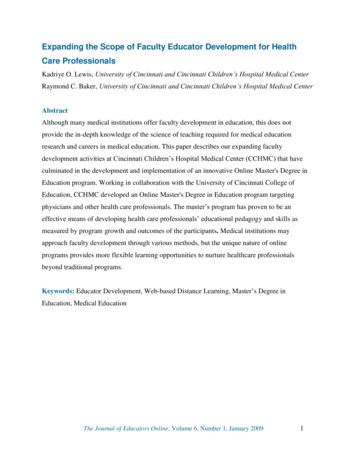
Transcription
Expanding the Scope of Faculty Educator Development for HealthCare ProfessionalsKadriye O. Lewis, University of Cincinnati and Cincinnati Children’s Hospital Medical CenterRaymond C. Baker, University of Cincinnati and Cincinnati Children’s Hospital Medical CenterAbstractAlthough many medical institutions offer faculty development in education, this does notprovide the in-depth knowledge of the science of teaching required for medical educationresearch and careers in medical education. This paper describes our expanding facultydevelopment activities at Cincinnati Children’s Hospital Medical Center (CCHMC) that haveculminated in the development and implementation of an innovative Online Master's Degree inEducation program. Working in collaboration with the University of Cincinnati College ofEducation, CCHMC developed an Online Master's Degree in Education program targetingphysicians and other health care professionals. The master’s program has proven to be aneffective means of developing health care professionals’ educational pedagogy and skills asmeasured by program growth and outcomes of the participants. Medical institutions mayapproach faculty development through various methods, but the unique nature of onlineprograms provides more flexible learning opportunities to nurture healthcare professionalsbeyond traditional programs.Keywords: Educator Development, Web-based Distance Learning, Master’s Degree inEducation, Medical EducationThe Journal of Educators Online, Volume 6, Number 1, January 20091
IntroductionFaculty development in education refers to a broad range of educational activities thatinstitutions provide to enhance professional career growth of practitioners and teaching faculty intheir roles as medical educators (Steinert et al., 2006). Faculty development activities assistfaculty not only with acquiring new teaching skills and exploring more advanced educationalresources, but also with developing insights into the pedagogy behind their teaching practice.Approaches to these activities range from professional orientation for new faculty members toinstructional development, leadership development, organizational development, individualdevelopment, continuing education, and in-service education.Faculty development activities are highly valued for professional development in medicaleducation. Although teaching is often an expectation and responsibility of physicians and otherhealth care professionals, most physicians receive no formal training in teaching pedagogy or“pedagogical content knowledge” during medical school (Geddis, 1993; Shulman, 1987) andlittle during post-graduate medical training. These teaching responsibilities begin during postgraduate medical education, which makes it important to begin training in educational pedagogyduring residency and fellowship and then sustain it by means of continuing medical education.For medical educators professional development in education and teaching is essential and mostcommonly obtained through faculty development programs designed to enhance instructionalskills (Skeff et al., 1997). These programs are a valuable means to help medical professionalsreceive the “specialty” training they need to achieve their professional career goals in medicaleducation. Furthermore, "comprehensive faculty development empowers faculty members toexcel as educators and to create vibrant academic communities that value teaching and learning”(Wilkerson & Irby, 1998, p.387).PurposeThe purpose of this article is to describe the evolution of the faculty development program at theCincinnati Children’s Hospital Medical Center into a comprehensive, multilevel programculminating in an innovative Online Master’s Degree in Education. A secondary purpose is toshare the important lessons we learned from collaborating with our College of Educationcolleagues at the university to expand and strengthen our educator development program. WeThe Journal of Educators Online, Volume 6, Number 1, January 20092
anticipate that describing our experience will be useful to other educators with similar goals ineducator development.BackgroundThe Faculty Development Program at Cincinnati Children's Hospital Medical Center (CCHMC)began in the fall of 1995 with a basic faculty development course targeting 1) communityphysicians who teach residents in their offices, and 2) members of the Division of General andCommunity Pediatrics who play a prominent role in resident and medical student education ingeneral pediatrics. Since that first course, the faculty development program has becomeintegrated into the overall teaching program of the medical center and expanded to acomprehensive, integrated, interdisciplinary program targeting learners at all levels. The currentprogram offers educator development to all disciplines in medicine, nursing, and ancillary healthprofessionals at multiple levels of learners including residents, fellows, junior faculty, andexperienced medical educators (see Table 1).TABLE 1: Educator Development Activities at CCHMCType of FacultyDevelopmentResidents asTeachersGoals & ObjectivesTarget AudienceFormatTo train residents in basicteaching skills.Residents at alllevelsSeries of 45-minuteinteractive sessionsMonthly as part ofresident teachingconferencesFellows TeachingWorkshopTo develop and expand theteaching skills of theclinical fellows atCCHMC to become bettereducators in theirdiscipline.Clinical fellowsfrom alldisciplines ofmedicine andsurgeryInteractive one-dayworkshopAnnual, in earlysummerBasic EducatorDevelopmentWorkshopTo increase teachingeffectiveness and expandknowledge of teachingmethodologies andstrategiesAcademic andvolunteer faculty,communityphysiciansFour-day workshop –didactic & interactivesessions with role-playactivities and smalland large groupdiscussionsAnnual -generallyin earlyNovember (2days), March (1day) and May(final day)Advanced EducatorDevelopmentWorkshopTo improve medicaleducators' professionalskills and to expand theirteaching and educationalpractices based on theapplication of advancededucational theoriesMedicaleducation faculty(regional andnationalaudience)Interactive and handson sessions designedfor the moreexperienced medicaleducator.Annual two-dayworkshop inSeptemberThe Journal of Educators Online, Volume 6, Number 1, January 2009Duration3
With the expansion and success of the educator development program, the faculty developmentteam at CCHMC recognized a need for advanced, graduate level training in education for careermedical educators as an extension of current offerings. This need was confirmed by informalneeds assessments at local, regional and national meetings and supported by the availability ofgrant monies for such programs from the Health Services and Resources Administration (HRSA)Bureau of Health Professions (BHPr). This federal agency provides grant funding for mastereducator fellowship programs that offer a Master’s Degree in Education (Faculty Developmentin Primary Care Grant Program Application, 2007). Further evidence for the desirability ofgraduate level training of medical educators comes from a broad based examination of theliterature which suggests that medical education research is most commonly conducted by careermedical educators with advanced graduate training in education (Berlin, 1996; Bligh &Brice, 2008; Brotherton et al., 2004; DeWitt & Baldwin, 1992; Lough, 2006; MER, 2008;Williams & Gerrity, 2005). Also, medical schools and residency programs are increasinglyincorporating internet-based education into their curricula (Bove, 2008; Casebeer et al., 2002;Waggoner & Martin, 2006; WorldWideLearn, 2008; Wutoh et al., 2004). This requires expertisein distance learning technologies, which are commonly included in formal graduate programs ineducation.In order to address this need, members from the faculty development program at the Universityof Cincinnati (UC) College of Medicine Department of Pediatrics approached the faculty fromthe UC College of Education (COE) in 1998 and presented the idea of developing a master’sdegree program for healthcare professionals (Lewis & Baker, 2005). In early 1999, planningbegan for the development and implementation of a Master’s Degree in Education programtailored to physicians and other healthcare professionals.Program RationaleThe primary goal of the Master’s Degree in Education Program was to provide innovativesolutions to existing healthcare professionals’ educational needs for 1) knowledge building, 2)knowledge mobilization, and 3) transfer into practice, all within the domains of medicaleducation and professional development.The Journal of Educators Online, Volume 6, Number 1, January 20094
The rationale for this program, which is similar to the rationale for faculty development ineducation in general, comes from several issues in medical education. Teaching is a significantresponsibility of most physicians. They teach in several different settings, including lecturing inthe traditional classroom setting, presenting at medical conferences, conducting teaching orattending rounds on patients with students and residents, and teaching one-on-one at the bedside.Yet, formal instruction in effective teaching principles and teaching methods is absent from mostmedical school curricula. Secondly, as resident primary care education has moved from thehospital to the community setting, physician educators are needed to train community physiciansin their new role as teachers as well as to provide academic physicians the educational pedagogyof effective teaching. Finally, medical education in the 21st century is changing from thetraditional emphasis on teacher-centered, didactic instruction to new interactive methods drawingon the principles of adult learning theory. Computer assisted teaching and learning is developingto address these principles and to meet the needs of disparate learners. These issues requireformal training in educational pedagogy and educational research to advance medical educationas a discipline.Program Development Approach and ImplementationIn the fall of 1999, four pediatricians from the faculty development team volunteered to enroll ina master’s level graduate program at the UC COE with a major in Curriculum and Instruction(Lewis & Baker, 2006). This first pilot group of faculty volunteered because of their activeinvolvement in the faculty development program and extensive experience in medicine andmedical education (average 26 years). The objectives of this pilot group were to: 1) learn thecontent and scope of the existing master’s degree in education program, 2) design appropriatemedically oriented learning activities and evaluation techniques in order to customize and tailorthe coursework to healthcare professionals, 3) evaluate the time feasibility of the program in thecontext of full-time professional duties, 4) determine the appropriate format for the program tomaximize accessibility and flexibility, 5) evaluate the curriculum of the program relative to theneeds of medical educators, and 6) receive the advanced education and degree offered by theprogram. This first pilot group took the coursework in a combined in-class (10 courses) anddistance-learning format (2 courses) from 1999 to 2001.The Journal of Educators Online, Volume 6, Number 1, January 20095
Following completion of the coursework by the first pilot group of four physicians, thecurriculum committee finalized the curriculum with input from this group and COE faculty andredesigned it to an all-online format. In the fall of 2001, the second pilot group of six physicians(three local and three distance) enrolled in the all-online format program. This group’sexperiences with the program raised new questions about the role of the faculty in onlineteaching, course design, and administration issues. Three participants left the program at the endof the first year: one due to a change in career direction, a second due to time commitment andpersonal issues, and a third who was dissatisfied with some of the course instructors. Theexperience and feedback from the second pilot group suggested that we 1) focus on recruiting acore group of dedicated instructors from the COE who were fully supportive of the program, 2)search for a support tool for synchronous meetings (we selected WebEx, an internet-enabledconferencing tool), 3) add curriculum development and evaluation to the curriculum, and 4)focus on orientation and online course materials development (Lewis & Baker, 2005).With the final revisions, the Online Master’s Degree in Education Program was launchednationally in the fall of 2002. The target group was 1) physicians, nurses, and other healthprofessionals with significant teaching responsibilities and interests, 2) physicians, nurses, andother health professionals with responsibilities and interests in educational research, and 3)physicians in academic clinical fellowships in all disciplines who are seeking an advanceddegree alternative to the more traditional research-oriented M.P.H. and M.S. graduate degrees.Program ObjectivesIn consideration of and consistent with the mission of faculty educator development at CCHMC,we established the following objectives for the Master’s Degree program: Offer an accredited, advanced degree program in education resulting in a Master'sDegree in Education with a major in Curriculum and Instruction (C&I) and anemphasis on medical education Provide the instruction online in order to maximize flexibility and accessibility of theprogram and reach a national audience of full-time health care professionals. Offer the instruction via Blackboard, a user-friendly, web-based infrastructuresoftware program designed for e-LearningThe Journal of Educators Online, Volume 6, Number 1, January 20096
Provide opportunities for participants to develop educational projects at their homesite and receive credit for those efforts as part of organized coursework Provide avenues for continuing professional development and continual learning sothat healthcare professionals can meet their educational and professional career goals Train healthcare professionals as effective educators within three educational themes:Adult Learning, Curriculum and Teaching, and Educational Evaluation and Research Increase participants’ contemporary knowledge of the methods and techniques ofteaching and learning Develop participants’ competencies in educational program planning and evaluation Provide knowledge of the methods of assessing and evaluating learners' progress Develop participants’ skills in the effective use of technology and instructional media Provide participants with opportunities to engage in activities designed to improveteaching and learning in educational settings Improve educational research methods and strategiesProgram CurriculumThe curriculum of the Online Masters program was adapted from the existing K-12 and highereducation Curriculum and Instruction (C&I) major, already offered by the COE. The curriculumwas modified to suit the medical education environment by the first pilot group of fourphysicians from CCHMC. The resulting curriculum meets the standard of a Master’s Degree inEducation as required by the COE with the appropriate rigor and breadth of the degree.The 45 credit hour program spans a two-year period of part-time course work. Online orientationat the beginning of the program is provided to increase student readiness for Web-based distancelearning in general, learn how to navigate the online course platform (Blackboard), andparticipate in internet-enabled conferencing tool (WebEx). Based on participants’ preference theprogram can be extended to more than two years by special arrangement. The most commonreason for extending the length of the program is to accommodate physicians whose professionalresponsibilities preclude taking two courses per quarter. All courses are offered through the UCCOE, Division of Teacher Education. There are three educational themes in the curriculum: adultlearning, curriculum and instruction, and evaluation and educational research. In addition to theThe Journal of Educators Online, Volume 6, Number 1, January 20097
required core courses, participants are required to complete an individual study (or elective), apracticum, and a master’s project. The individual study includes specific topics selected by theparticipants that are related to medical education. For the required practicum, participantsprepare an electronic educational portfolio which is a collection of descriptions of variousteaching activities and work product and documented evaluations of those teaching projects(combination of self-evaluation, peer evaluation, and supervisor evaluations). The master’sresearch project is required to complete the program. This project provides participants theopportunity to conduct an original educational research project of their own choice, usingknowledge gained from coursework. Twenty (20) hours per year of Category I ContinuingMedical Education credit are awarded to participants.Certificate in Medical Education ProgramIn addition to the master’s program, we offer a “Certificate in Medical Education” program,which is derived from the master’s program. The certificate program offers advanced training ineducational pedagogy to health care professionals in a less time-intensive format than themaster’s program. The goal of the certificate program is to expand core knowledge with practicalapplications and skills in educational pedagogy tailored to health care professionals. Thecertificate program consists of five core courses, selected by the participant, from the master’sprogram core curriculum. All of the courses, which are offered online, are taken for graduatecredit and are applicable toward the certificate program, the master’s program, or can betransferred to other university programs. This option gives greater flexibility to our audience toenroll in individual courses, often as a preliminary to enrollment in the larger master’s program.The Certificate program does not require application and admission to graduate school.Challenges in Program DevelopmentWe have previously reported the challenges we faced in the development of the faculty educatordevelopment program focusing on the master’s program (Lewis & Baker, 2005). The importantlessons we learned from these challenges are likely to be applicable in other programs who seekto incorporate graduate level training into their faculty educator development programs:The Journal of Educators Online, Volume 6, Number 1, January 20098
1.Cultural differences between professional educators and, in our situation, medicaleducators must be recognized and addressed. This concept includes the politics andadministrative requirements of the two disciplines.2.A needs assessment of faculty interest and expertise must be performed and trainingoffered to novices in distance education.3.The time and human resources required to plan and develop a comprehensiveprogram in educator development are significant and require considerable financialbacking and manpower (planning, web design, marketing, cost analysis).Current Status of the ProgramThis program now provides national and international program participants with a quality,accredited, advanced graduate degree in education designed to promote health careprofessionals’ short and long-term career goals as productive scholars. To facilitate programinitiatives and activities we were also fortunate to obtain grant support from HRSA, Bureau ofHealth Professions to partially fund this program for the three years from July 1, 2003 throughJune 30, 2006, including scholarship monies that help us recruit more students (Baker, 2003).Since the program inception in 2002, one hundred ten (110) students have enrolled in theprogram, 56 females and 54 males. The mean age of participants was 40 (range 27-64).To date (July 2008), 20 participants have graduated from the program and received their degrees.Currently, we have 73 active students who are taking the courses on a regular basis (thirteen ofthese are in the certificate program). Seventeen (17) students have withdrawn from the programfor an overall retention rate of 85 %).Program EvaluationEvaluation and assessment of online programs are crucial to making appropriate modificationsfor effective instruction as well as to monitoring fidelity in all phases of the program (Resnick etal., 2005). Based on the best practice guideline of the online masters program, the programevaluation is an ongoing process to ensure that the stated mission and goals of the program areaccomplished including the following objectives: Review and monitor the program effectively by assessing its quality and progressThe Journal of Educators Online, Volume 6, Number 1, January 20099
Enable the program team to make changes that improve program effectiveness. Provide information about delivery that will be useful to the program team. Determine the effectiveness of the program to participants. Document that the program objectives have been met.Program evaluation includes both qualitative and quantitative data from a variety of evaluationmethods such as individual course evaluation, needs assessments, cost analysis and programeffectiveness (e.g. outcome). For most profit-based programs, a performance measure used toevaluate cost effective outcomes is the return on investment (ROI), which is a metric thatcompares the program’s monetary benefits with the cost of training. However, for the onlinemaster’s program our evaluation is based on academic productivity and advancement generatedfrom an investment in this program. We presuppose that this productivity will produce a morelong-term monetary value indirectly through grant activity, promotion, salary increase, and localand national recognition.In order to monitor program outcomes, program graduates and participants are asked to completean annual survey of the effects of the program on their professional lives including changes inacademic position and location, promotions, participation in medical education activities,national presentations in the area of medical education, publications in peer-reviewed journals(of educational research and program description), and educational grant activities.The master’s program appeals to a broad spectrum of medical educators from multiple medicaldisciplines and across a wide age range. Of the first seventeen graduates from the program, tendisciplines were represented and the age range of the graduates was 28 to 57 years of age (Table2).The Journal of Educators Online, Volume 6, Number 1, January 200910
TABLE 2: Demographics of Program Graduates (n 17)*Age atEntry54GenderDisciplinePosition/TitleMGeneral PediatricsProfessor, Director Education Section, Gen.& Comm. Pediatrics57FGeneral PediatricsPediatrician200139MInternal MedicineAssistant Professor200542MOphthalmologyClinical Professor; Director of ResidentEducation200556FMedical EducationDirector, Clinical Skills ate Professor200543FPediatrics-InternalMedicineProgram Director, Internal MedicinePediatrics200543FPediatric EmergencyMedicineAssociate Professor200531MGeneral PediatricsAssistant Professor200636MEmergency MedicineAssistant Professor200647MFamily MedicineAssistant Director - Flower Family PracticeResidency200639MPediatric EmergencyMedicineAssociate Director, Division of EmergencyMedicine200750MPediatric RheumatologyDirector of Clinical Services; Professor ofPediatrics200732MObstretrics &GynecologyResident Physician200727FNursing and SimulationSimulation Specialist and Instructor200734MEmergency MedicineAttending Physician2007Emergency MedicineStaff Physician200733M* As of December 2007Year ofGraduation2001The annual survey results of outcomes of the graduates of the program indicate a successfulprogram. The outcome goals of the program included 1) the ability to apply knowledge, conducteducational research and evaluation, and publish results in peer-reviewed journals, 2) ability topresent scholarly works in a national/international forum, 3) ability to compete successfully forThe Journal of Educators Online, Volume 6, Number 1, January 200911
grant monies, and 4) ability to teach with distinction and be recognized for educationalachievements. Using the metrics of publications in peer-reviewed journals, national/internationalpresentations, successful grant applications, promotion, and teaching awards that correspond tothese goals, eleven (11) of the graduates published papers in peer-reviewed journals. Elevengave 164 national and international presentations, nine (9) were awarded 21 educational grantstotaling 4,250,000, and ten (10) graduates garnered 37 teaching awards and 6 promotions athome institutions.The following comments are drawn from the annual survey of graduates and participants:“The Masters Program has given me new ideas which help in these changing times of graduatemedical education. I have been able to plan and write curriculum more effectively. I have beenable to use the evaluation instruments at our institution more effectively. My teaching style hasbeen broadened. I am better prepared to assume more administrative duties such as residencydirector.”“The masters program has served to strengthen my skills and confidence in teaching. Theprogram has improved my job satisfaction. I have had a promotion from assistant to associateresidency director.”“As a result of entering this program, I have accomplished many of my goals as an educator.Currently my department is seeking to promote me to a higher position. My supervisor has alsostated that she is considering me for another promotion upon completion of the mastersprogram. I have been given new responsibilities such as seeking opportunities for additionalfunding for the department. I have been recognized as a representative for my department,managing outcome data, and taking the lead in coordinating day-to-day activities. I also wantedto state that I have learned new information that has furthered my development in my career.Examples of my development include writing and reviewing grants. I also feel better about myjob and I'm satisfied with my job and new responsibilities.”“It has directly led to opportunities to speak at education conferences and to implement theeducational grant associated programs. I was also asked to be a member of a task force/focusThe Journal of Educators Online, Volume 6, Number 1, January 200912
group for San Diego State University for its new certificate program in Medical Educationoffered through extension.”“While I am still early in my academic career, the skills I have gained during the master'sprogram have had a great impact on my development of a niche within my field of pediatricemergency medicine.”“The master's program has given me the opportunity and knowledge to ask and study educationbased research questions. It has also given me the ability and stature within my department todesign curriculum. It has improved my recognition within my department of 40 physicians andgiven me a promotion to my current position. Hopefully, with the publication of my efforts to thispoint, my national and regional career will also be enhanced.”ConclusionsFaculty development activities are essential to professional growth and career development, butfor medical educators these activities must be varied and adaptable to the specific needs ofmedical professionals (Benor, 2000). Such activities can take many forms, from self-directedactivities to organized programs of learning. Most medical academic centers have recognized theimportance of formal educator development and “Teaching Scholars Programs” (Fidler et al.,2007), and have developed faculty development courses and workshops to improve the quality ofteaching. However, this effort lacks the depth of knowledge necessary to teach from aneducational conceptual base and to conduct educational research to document learning outcomesof these educational efforts required of career medical educators. As more medical institutionsrecognize this need and sponsor medical education as a distinct discipline, formal graduateprograms in education are needed to provide health care educators with this in-depth knowledge.An important outcome of these formally trained medical educators will be leadership for thisdeveloping discipline. Several programs exist in the US and abroad that offer Master’s Degreesin Education emphasizing medical education (Cohen et al., 2005), but most are either classroombased or have significant on-site requirements, which can be a deterrent to potential participantswith busy professional and personal lives.The Journal of Educators Online, Volume 6, Number 1, January 200913
Recognizing these limitations, we developed an all-online master’s program for health careprofessionals that take full advantage of Web-based instruction and the accessibility it affords.We believe that this online program and others like it will be available to a wide spectrum ofhealth care professionals in an Internet-based format that takes advantage of the power andflexibility of distance learning, and will serve as a model for the delivery of web-based medicalgraduate education. The program encourages healthcare professionals to improve their teachingskills, acquire new teaching methods and strategies, improve their ability to integrate technologyinto teaching, influence curriculum development and evaluation, and conduct educationalresearch. Much as health care professionals have embraced the concept of evidence-basedmedicine based on medical research and controlled trials, the curriculum and content of thisprogram introduce participants to the large body of educational research that supports theconcept of evidence-based education (The Wing Institute, 2006)Professional development is an enduring need for all faculty with teaching res
Raymond C. Baker, University of Cincinnati and Cincinnati Children's Hospital Medical Center Abstract . development, continuing education, and in-service education. Faculty development activities are highly valued for professional development in medical education. Although teaching is often an expectation and responsibility of physicians .


